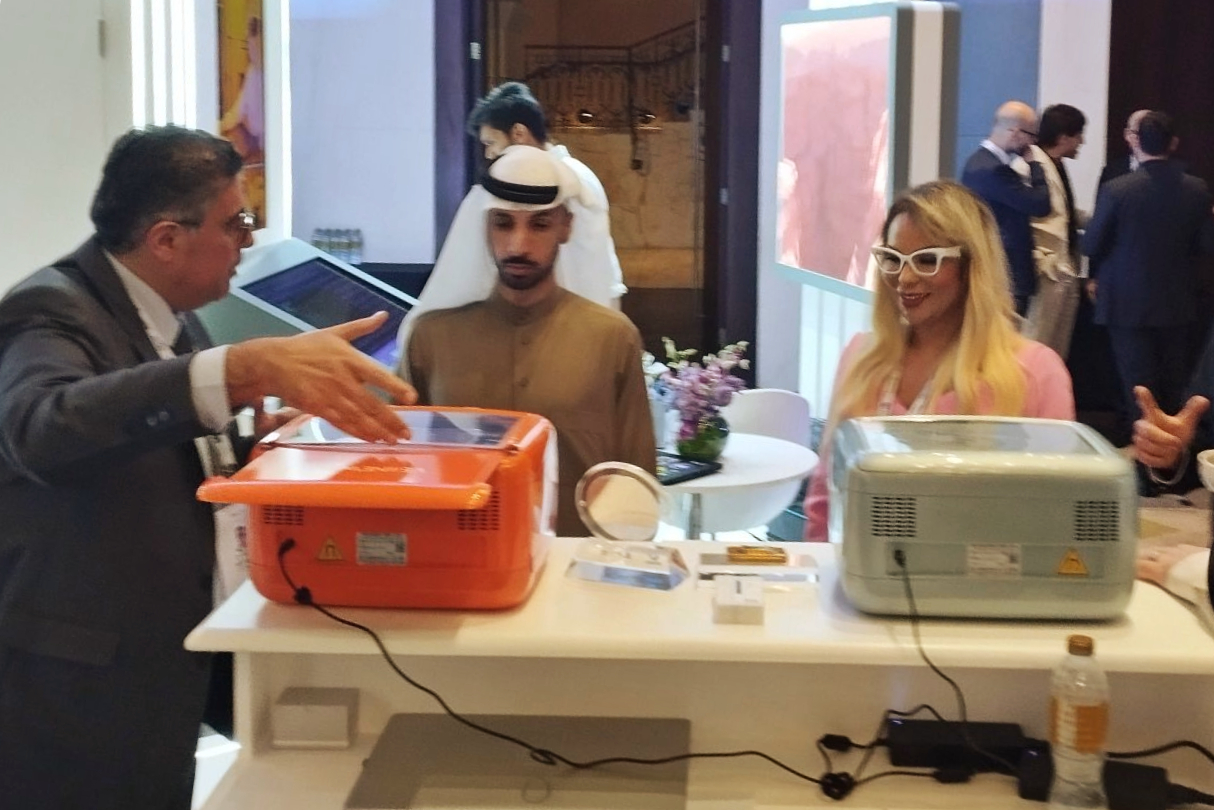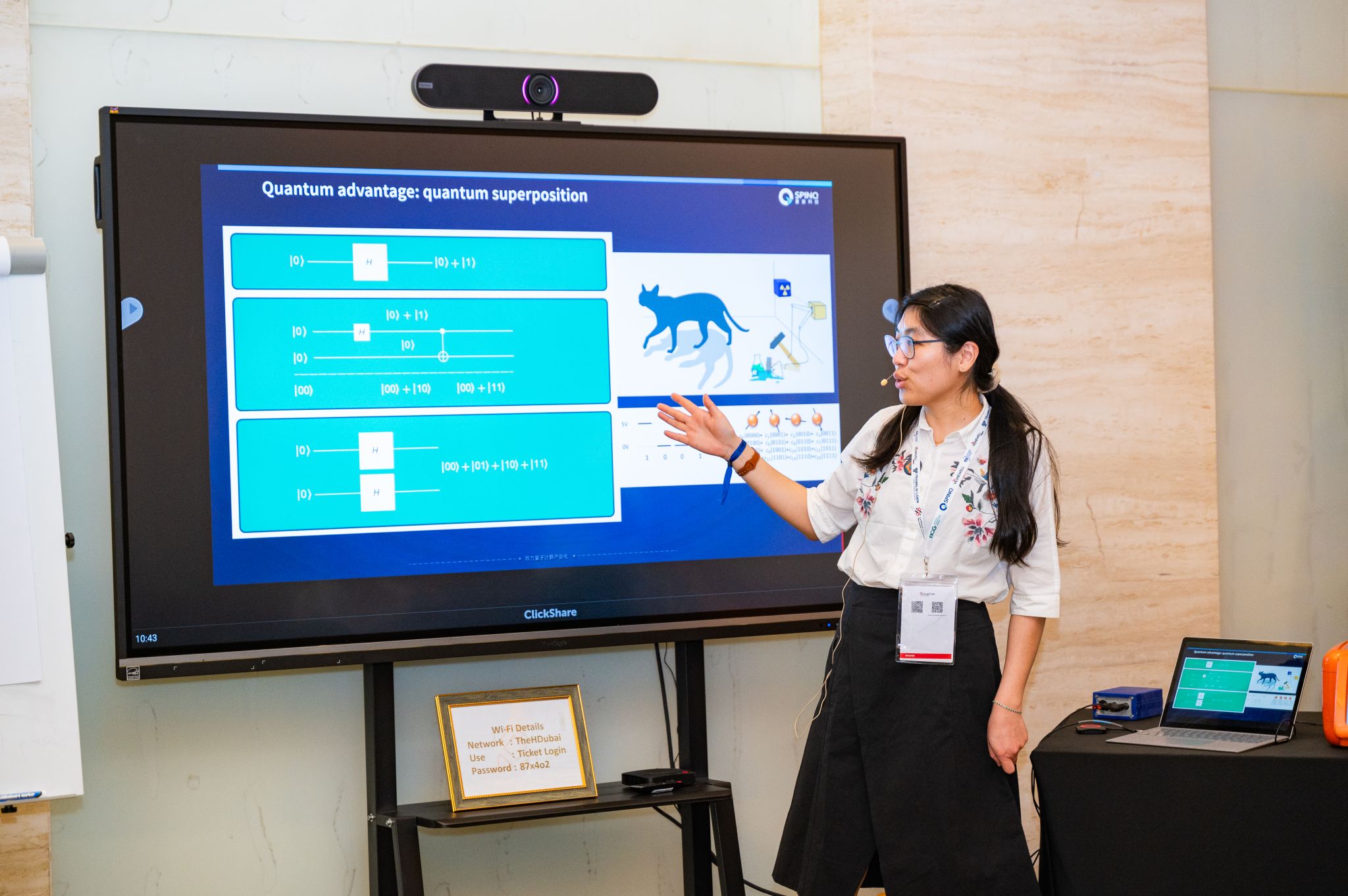SpinQ Engages with Global Quantum Elites at the Quantum Innovation Summit
2024.03.08 · Press Release quantum advantagequantum readyquantum supremacy
The inaugural Quantum Innovation Summit (QIS), a landmark event in the quantum computing industry, recently occurred in Dubai, United Arab Emirates. The summit attracted over 1,500 quantum experts and technical elites from more than 50 countries and regions. SpinQ Technology, the sole Chinese quantum technology company in attendance, received the "Quantum Technology Dissemination Award" in acknowledgment of its significant contributions to the growth of the quantum industry and the facilitation of technological cooperation.
.jpg)
During the summit, Dr. Feng Guanru, Co-Founder and Senior Scientist at SpinQ, and Dr. Zou Hongyang, Vice President of SpinQ, participated in discussions with global quantum computing experts and corporate representatives about the future direction of quantum technology.
"Global Industry Exchange Drives Quantum Technology Innovation"
Quantum computing is still emerging. Without collaboration and the sharing of innovative knowledge and experiences across the industry, there is a risk of wasted resources, unclear market demands, and limited competitiveness, which could hinder innovation and development.
"Achieving industry consensus on the importance of quantum technology is crucial. The summit offers an excellent platform to discuss its significance, challenges, and potential, potentially attracting more attention and support from relevant sectors," said Dr. Feng Guanru. She believes that industry events allow teams to share successful cases and lessons learned, fostering consensus, inspiring new technological ideas and development opportunities, and expanding the quantum industry's influence.

Attendees Show Strong Interest in SpinQ’s NMR Quantum Computer and Superconducting Quantum Chip
In his keynote speech, Dr. Zou Hongyang introduced the global audience to the two main technological systems of quantum computers: superconducting and nuclear magnetic resonance (NMR). He explained that superconducting quantum computers use superconducting circuits to create qubits, which are manipulated by controlling microwave pulses, while NMR quantum computers use the spin properties of atomic nuclei as qubits, using radiofrequency pulses for similar manipulations. These differences lead to varying application scenarios, with the NMR system being particularly suitable for educational purposes.

Dr. Zou Hongyang Presents on "Introduction to Superconducting Quantum Computer and NMR Quantum Computer"
Currently, SpinQ's educational-grade NMR products, branded "SPINQ," have facilitated quantum computing education in over 30 countries and regions. SpinQ's commercial exploration and achievements in quantum education also provide valuable reference experiences for the industry.
Dr. Feng Guanru believes that desktop NMR quantum computing platforms for educational purposes offer students the opportunity to learn both the theory and practice of quantum computing, allowing them to engage with the abstract world of quantum mechanics. Desktop NMR quantum computers enable students to perform real computational tasks, such as running Grover's algorithm or conducting Bell inequality experiments. These innovative tools, along with their accompanying high school quantum computing courses and university laboratory courses, have effectively promoted quantum education.

Dr. Feng Guanru Leads a Seminar on "The Application of Desktop Quantum Computers in Education"
"Hands-On Practice is Essential in Quantum Education"
The dissemination of knowledge in cutting-edge technologies often faces challenges due to a scarcity of qualified instructors, highlighting the necessity for companies to innovate based on "practical needs" and provide mature educational products and solutions.
The conference also featured lively discussions on "how to make quantum technology more accessible to the public." Dr. Feng Guanru shared SpinQ's experiences in promoting high school quantum education. She emphasized the importance of hands-on practice in the quantum education process. "We have collaborated with several high schools to establish quantum computing classrooms where students can conduct hands-on experiments while learning quantum computing. I believe hands-on practice is crucial for them to intuitively understand quantum computing and form a foundational understanding of its components."
SpinQ Gemini Mini Supports Shenzhen Middle School in Offering Quantum Computing Courses
Quantum computing is a complex discipline, and to make it more accessible for everyday use, it is essential to simplify its application. In this regard, Dr. Feng Guanru summarized SpinQ's explorations in product functionality: "We have designed and produced compact, user-friendly desktop quantum computers for educational and outreach purposes. Students can use them directly; moreover, we have developed comprehensive courses and quantum games to accompany these hardware devices, transforming the complex process of theoretical learning into interactive learning, which is particularly suitable for beginners. These devices have made quantum computing more accessible, achieving the democratization of quantum computing."
"Policy is a Powerful Demand Signal and Can Act as a Catalyst for Innovation and Growth"
The development prospects and application potential of quantum technology are widely acknowledged. However, the advancement of quantum technology faces significant challenges, including high technical barriers, lengthy R&D cycles, and substantial upfront investment. During the panel discussion titled "Quantum Infrastructure: Building Capabilities for Future Technologies" at this summit, Dr. Feng Guanru, Senior Scientist at SpinQ, emphasized the importance of government policy support. "Developing a new technology requires financial backing and necessary investments in infrastructure to propel technological progress and development," she stated.

Dr. Feng Guanru Shares Her Views During the Panel Discussion
Furthermore, policy plays a critical guiding role in clarifying development directions, creating market demand, and reducing innovation risks. As Dr. Feng Guanru mentioned, "Policy is a powerful demand signal and can act as a catalyst for innovation and growth." Policies provide market participants with a clear framework for action and expectations, becoming a positive market demand signal that guides innovation resources more effectively into the quantum computing field, thereby fostering technological breakthroughs and industry upgrades.
Committed to the industrialization and democratization of quantum computing, SpinQ showcased China's "quantum computing business card" on the international stage of the Quantum Innovation Summit. In the future, SpinQ will continue to deepen global cooperation and exchange, sharing our explorations and achievements with relevant institutions and professionals in more countries and regions, and jointly advancing the development of international quantum computing.
Contact Us
Featured Content







